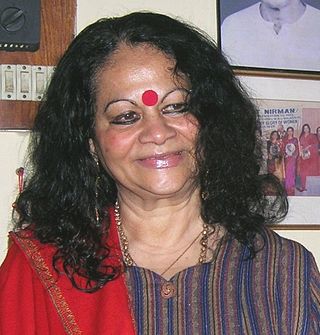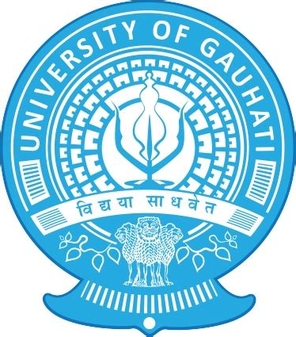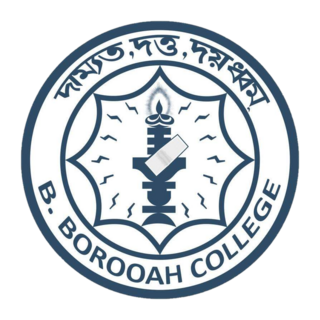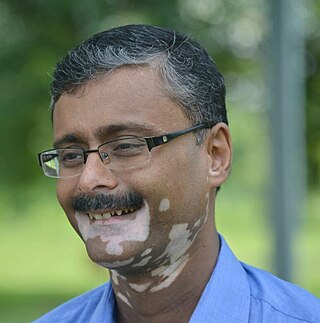
Indira Goswami, known by her pen name Mamoni Raisom Goswami and popularly as Mamoni Baideo, was an Indian writer, poet, professor, scholar and editor.

Assamese literature is the entire corpus of poetry, novels, short stories, plays, documents and other writings in the Assamese language. It also includes the literary works in the older forms of the language during its evolution to the contemporary form and its cultural heritage and tradition. The literary heritage of the Assamese language can be traced back to the c. 9–10th century in the Charyapada, where the earliest elements of the language can be discerned.

Gauhati University also known as GU, is a collegiate public state university located in Guwahati, Assam, India. It was established on 26 January 1948 under the provisions of an Act enacted by the Assam Legislative Assembly and is the oldest university in Northeast India.
Bhabendra Nath Saikia was a novelist, short-story writer, editor and film director from Assam, India. Dr. Saikia received his doctorate in physics from the University of London. He began his career as a reader in the Department of Physics, University of Guwahati. He later played an important role in the publication of college level textbooks in the Assamese language during his tenure as the Secretary of the Co-ordination Committee for production of textbooks in regional languages.

Prof Bhabananda Deka was a pioneer Assam economist and author who conducted novel research on the economy of the far eastern part of India. He was also a leading Indian-Assamese litterateur of the famed 'Awahon-Ramdhenu Era' of Assamese literature during the mid-20th century. He was the author of a total of 115 English and Assamese books including textbooks on a range of fifteen subjects including economics, ancient Assamese literature, philosophy, education, religion, mythology, archaeology, tribal study, poetry, drama, memoirs, civics, political science, biographies; he also edited books and journals. He also authored a variety of research papers and articles about the state of Assam, a state in the north-eastern part of India. He pioneered the writing of books on Economics in Assamese. His Assamese book Axomor Arthaneeti was the first ever research-based comprehensive book on Assam Economics, which was published for the first time in 1963. He was conferred with the honorary title of 'Asom Ratna' -- 'Jewel of Assam' by the intellectuals of Assam on 19 August 2007 at a public meet held under the presidency of Prof. (Dr) Satyendra Narayan Goswami.
Goalpara College is an institution of higher learning in western Assam, India. It was established in 1955 with the help and cooperation from local people. At present, it has 16 departments with a total staff strength of 110. It is affiliated to Gauhati University, Guwahati.

Deori is a Tibeto-Burman language in the la Tibeto-Burman languages family spoken by the Deori people of Assam and Arunachal Pradesh. Deori are also a part of Bodo–Kachari people. Among the four territorial groups only the Dibongiya have retained the language. The others—Patorgoyan, Tengaponiya, and Borgoyan—have shifted to Assamese. It is spoken in Lohit district of Arunachal Pradesh, and in Lakhimpur, Dhemaji, Tinsukia, Sivasagar and Jorhat districts of Assam. The primary literary body of Deori is known as "deori chucheba chengcha".
Saurabh Kumar Chaliha is the pen name of a famous Assamese short story writer. His real name was Surendra Nath Medhi. His short story collection Ghulam won the prestigious Sahitya Akademi Award in 1974. Chaliha did not go to receive the award himself and it was later sent to him by the Akademi.

Hitendra Nath Goswami is an Indian politician from Bharatiya Janata Party. He served as Speaker of Assam Legislative Assembly from 30 January 2017 to 20 May 2021. Goswami is a member of Assam Legislative Assembly from Jorhat constituency. He was a member of Asom Gana Parishad until 16 February 2013, when he resigned from the party membership "expressing his frustration at the failure of the party leadership to bring in new blood to revive the regional force". He joined BJP on 10 March 2014 in New Delhi. However, he made it clear that he has nothing against the aims and objectives of the regional force and he would always continue his anti-Congress stand.

Jorhat is a city and a growing urban centre in the state of Assam in India.

Dr. Dinesh Chandra Goswami is an Assamese writer and winner of the Sahitya Akademi's Bal Sahitya Puraskar for 2014.
Girijananda Chowdhury Institute of Management and Technology, Tezpur (GIMT-Tezpur) is a private institute offering degree level technical courses in the State of Assam is a Private college established by Shrimanta Shankar Academy (SSA) Society and Government of Assam, India. The college was established with permission from the state government and approval from the All India Council for Technical Education (AICTE), New Delhi and is affiliated to Gauhati University (GU), Guwahati, Assam and also to Assam Science and Technology University (ASTU), Guwahati, Assam.
The Assamese Language Movement refers to a series of political activities demanding the recognition of the Assamese language as the only sole official language and medium of instruction in the educational institutions of Assam, India.
Nowgong College is an autonomous college affiliated to Gauhati University. Established in 1944, it is one of the oldest co-educational colleges of Assam, situated in the city of Nagaon. It was initially established with the permission of the University of Calcutta but later, in 1948, the college was accorded affiliation to the Gauhati University. On 22 December 2020, the college was granted autonomy by the University Grants Commission for a period of 10 years.

B. Borooah College, established in 1943, is one of the oldest degree college situated in Guwahati, Assam. It was named after Bholanath Borooah a businessman from Nagaon. This college is affiliated with the Gauhati University.

Mayur Bora is an Indian writer, critic and public speaker from Assam. Bora has 18 books to his credit, 16 in Assamese language, 1 in English and 1 book of translation in which noted litterateur Dilip Bora's short stories were rendered into English.
2013 Jhankar Saikia Mob Lynching happened in Diphu town, Karbi Anglong district, Assam, in India on 25 June 2013 when Diphu College student Jhankar Saikia and his father, Haren Saikia, refused to pay an auto-rickshaw fare of Rs. 30, when the regular fare was Rs. 20, and were attacked by a mob as a result.

Subrat Jyoti Neog is a Film Critic, a Theatre Critic and a Playwright from the Indian state of Assam. He teaches in Tezpur University at the department of Assamese as an associate professor.















